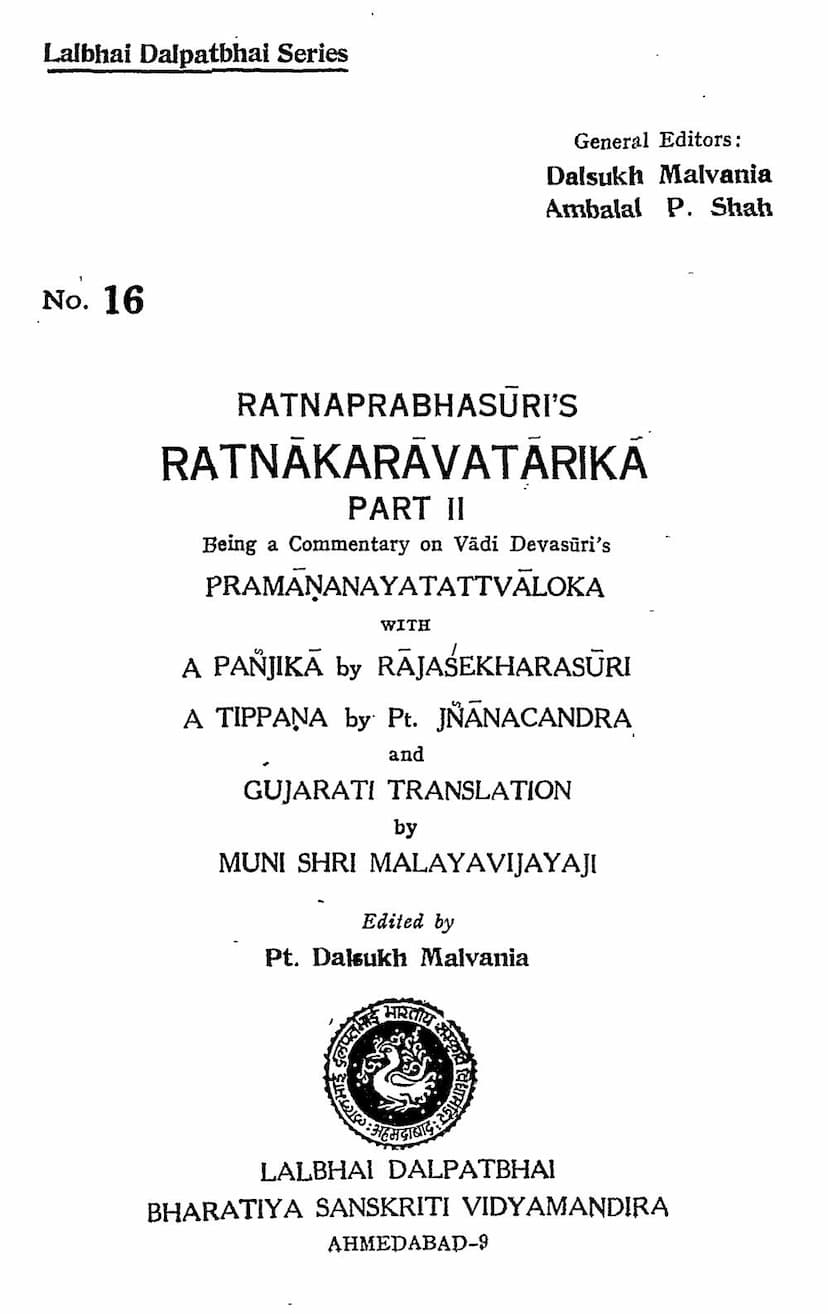Ratnakaravatarika Part 02
Added to library: September 2, 2025

Summary
Absolutely! Here is a comprehensive summary of the Jain text "Ratnakaravatarika Part 02" by Dalsukh Malvania and Malayvijay, based on the provided information:
Ratnakaravatarika Part II
This volume, part of the Lalbhai Dalpatbhai Series (No. 16), presents the second part of Ratnakaravatārikā, a commentary by Ratnaprabhasūri on Vādi Devasūri's Pramāṇanayatattvāloka. The text is enriched with two Sanskrit super-commentaries: a Pañjikā by Rājashekharasūri and a Tippaṇa by Pt. Jñānacandra. Muni Shri Malayavijayaji has provided a Gujarati translation, lauded for its lucidity and helpfulness in understanding the complex subject of Indian Logic.
Core Content and Significance:
- Commentary on Pramāṇanayatattvāloka: The Ratnakarāvatārikā serves as a detailed explanation of Vādi Devasūri's work, which is a foundational text in Jain epistemology and logic.
- Focus on Indian Logic: The commentary is particularly valuable for students of Indian Logic, offering insights into intricate concepts. A key feature highlighted is the Jain philosophical tradition's commitment to presenting the doctrines of other schools faithfully, providing a comprehensive understanding of various philosophical thought currents.
- Structure of Part II: Following the first part, which covered the first two chapters (Paricchedas), Part II includes chapters three through six. The remaining chapters will be in the anticipated third part, completing the work.
- Gujarati Translation: Muni Shri Malayavijayaji's Gujarati translation is noted for its clarity, accuracy, and the use of a dialogue style to make the concepts of premise and conclusion easily accessible to the reader.
Key Philosophical and Logical Concepts Discussed (as evident from the provided text excerpts):
The included text (pages 7-10 and beyond) reveals that Part II delves into significant aspects of epistemology and metaphysics within Indian logic, particularly from a Jain perspective. The summary below highlights the main topics covered, as indicated by the chapter titles and the beginning of the content:
-
Chapter 3: Determination of the Nature of Remembrance, Recognition, Logic, and Inference (स्मरण-प्रत्यभिज्ञान-तर्कानुमानस्वरूपनिर्णय):
- Remembrance (स्मरण): Discusses the nature of memory, its causes (impressions/sanskaras), its object (experienced realities), and its validity. It addresses the debate on whether remembrance is a valid source of knowledge (pramana).
- Recognition (प्रत्यभिज्ञान): Explains recognition as a form of knowledge arising from both past experience and present perception, examining its characteristics and validity, and refuting opposing views, particularly from Buddhist (Yaug) and Naiyāyika schools.
- Logic (तर्क): Defines logic or reasoning (tarka/uhā) as knowledge based on observation (uplambha) and non-observation (anupalambha), and the relationship between cause and effect across time (trikālika vyāpti).
- Inference (अनुमान): Details the nature of inference, its types (svārthānumāna and parārthānumāna), the conditions for a valid middle term (hetu), the fallacies of the middle term (hetvābhāsa), and the concepts of pervasion (vyāpti).
-
Chapter 4: Determination of the Nature of Scripture/Testimony (आगमस्वरूपनिर्णय):
- Scripture/Testimony (आगम): Defines scripture or testimony as knowledge derived from the word of a reliable person (āpta).
- Apta (Apt Source): Discusses the characteristics of a reliable source, including their infallibility and the nature of their words.
- Scripture's Authority: Examines the relationship between words (shabda), their meanings, and the validity of testimony, addressing different schools of thought on language and meaning (e.g., shakti, apoha).
-
Chapter 5: Determination of the Nature of the Object of Knowledge (प्रमेयस्वरूपनिर्णय):
- Object of Knowledge (Prameya): Delves into what can be known, likely discussing categories like generalities (sāmānya) and particulars (viśeṣa), and the Jain concept of substance (dravya) as having both general and particular aspects.
- Karma and its Resolution: The discussion on "prameya" likely includes aspects of karma and its relation to knowledge and liberation.
-
Chapter 6: Determination of the Nature of the Fruit of Proof and its Fallacies (फलप्रमाण-स्वरूपाद्याभासनिर्णयो):
- Fruit of Proof (Pramāṇaphala): Explains the result or fruit of valid knowledge (pramāṇa).
- Fallacies (Ābhāsa): Discusses the various types of fallacies (ābhāsa) that can occur in the process of knowledge acquisition, including those related to the nature of proof (pramāṇābhāsa), the object of knowledge (viṣayābhāsa), and the fruit of proof (phalābhāsa).
Editorial and Publishing Details:
- Publisher: L D Indology, Ahmedabad.
- General Editors: Dalsukh Malvania, Ambalal P. Shah.
- Editor: Pt. Dalsukh Malvania.
- Gujarati Translator: Muni Shri Malayavijayaji.
- Preface: The preface expresses gratitude to Muni Shri Malayavijayaji for the translation and acknowledges the use of the excellent edition by Late Pt. Hargovindas and Pt. Bechardas, as well as editions from Yashovijaya Jain Granthamāla. It also notes that the third part is in press.
- Date of Publication: The preface is dated 2-4-'68, indicating the publication year.
In essence, Part II of Ratnakarāvatārikā is a scholarly and critical examination of key concepts in Jain and broader Indian philosophical logic, presented through a detailed Sanskrit commentary and a lucid Gujarati translation, aiming to make this complex subject accessible to a wider audience.